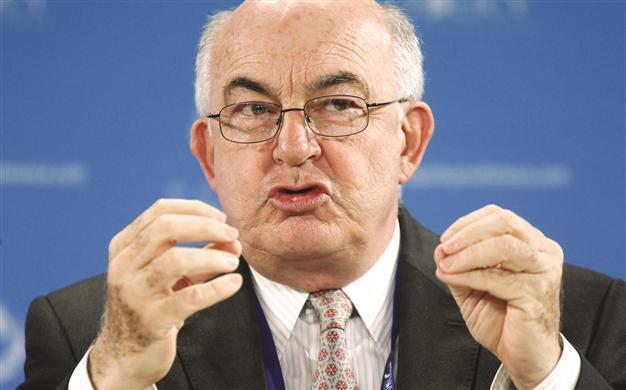Turkey is not in crisis but there is serious mistrust, says economist Kemal Derviş
Cansu Çamlıbel ISTANBUL / Hürriyet

The most important thing is not to give the impression that Turkey is in panic, says former Turkish Minister State for Economic Affairs Kemal Derviş. AFP photo
Turkey is not in crisis but the latest graft allegations have created an environment of mistrust, according to Kemal Derviş, the former chief of United Nations Development Programme (UNDP) and vice president of the Brookings Institution.
Derviş was in Istanbul to attend a series of meetings hosted by French President François Hollande, who visited Turkey last week and President Abdullah Gül.
How do you see the recent fluctuation in the Turkish economy?When there is a current account deficit exceeding 6-7 percent in proportion to national income, this creates a fragile environment. Countries which need investment, like Turkey, need capital from outside. The current account deficit was 9-10 percent when the country growth rate was 8-9 percent. It was much higher and it did not create a problem because everyone looks with optimism. But when the growth declines and the current account deficit grows, there is a problem. A 6 percent growth and around a 5 percent current deficit is the right one for Turkey. But now there is growth which could exceed 3.5 percent and the current deficit is at nearly 7 percent.
The Central Bank hiked the interest rates despite Prime Minister Recep Tayyip Erdoğan’s opposition, but it could not curb the increase in foreign exchanges. Why?If there is excessive political infighting, harsh rhetoric in the country and there are serious doubts on the quality of democracy and the independence of judiciary, the things the Central Bank can do remain limited.
Are we in crisis now?Let me not say a crisis, but it created an environment of serious mistrust. In a situation of a crisis, the freedom to use instruments is narrowed. When the short-term investor sees interest as a tool of panic and believes that the situation is not sustainable, the interest could not even answer the purpose. The most important thing is not to give impression that Turkey is in panic.
If we cannot overcome doubts over political stability and trust, is it possible to see a picture like in 2001 [when Turkey experienced a financial crisis]?Right now, this is not the situation, but unfortunately in recent years, there is not only a slowdown but also a reverse in the making with structural reforms. The saddest side of this for me is the repositioning of economic institutions, like the Central Bank, the Banking Regulation and Supervision Agency (BDDK), the energy watchdog and the competition authority, closer to politics again. The most important structural arm of the 2001 reforms is that those institutions, which audit and structure the economy, are separated from politics. Every citizen should know that they are treated the same. The interference of politics to daily market routine and private enterprise would collapse the country. This is the core problem and should be fixed.
How is Turkey perceived by foreign investors who want to invest in the long term?At this point, the most important question is: Are we a European or a Middle Eastern country? There is a problem in Europe but those problems have been solved in democracy. Where do we want to be in 2023? I think we should say clearly “in Europe.” Unfortunately, there is partly an understanding that “Turkey is being dragged into the Middle East conflict.” We should remove that doubt.
What is the way out of this situation?Fortunately, there is an election ahead. If this election is peaceful and democratic, which I hope for, the poll is a way out. They will give a message.
